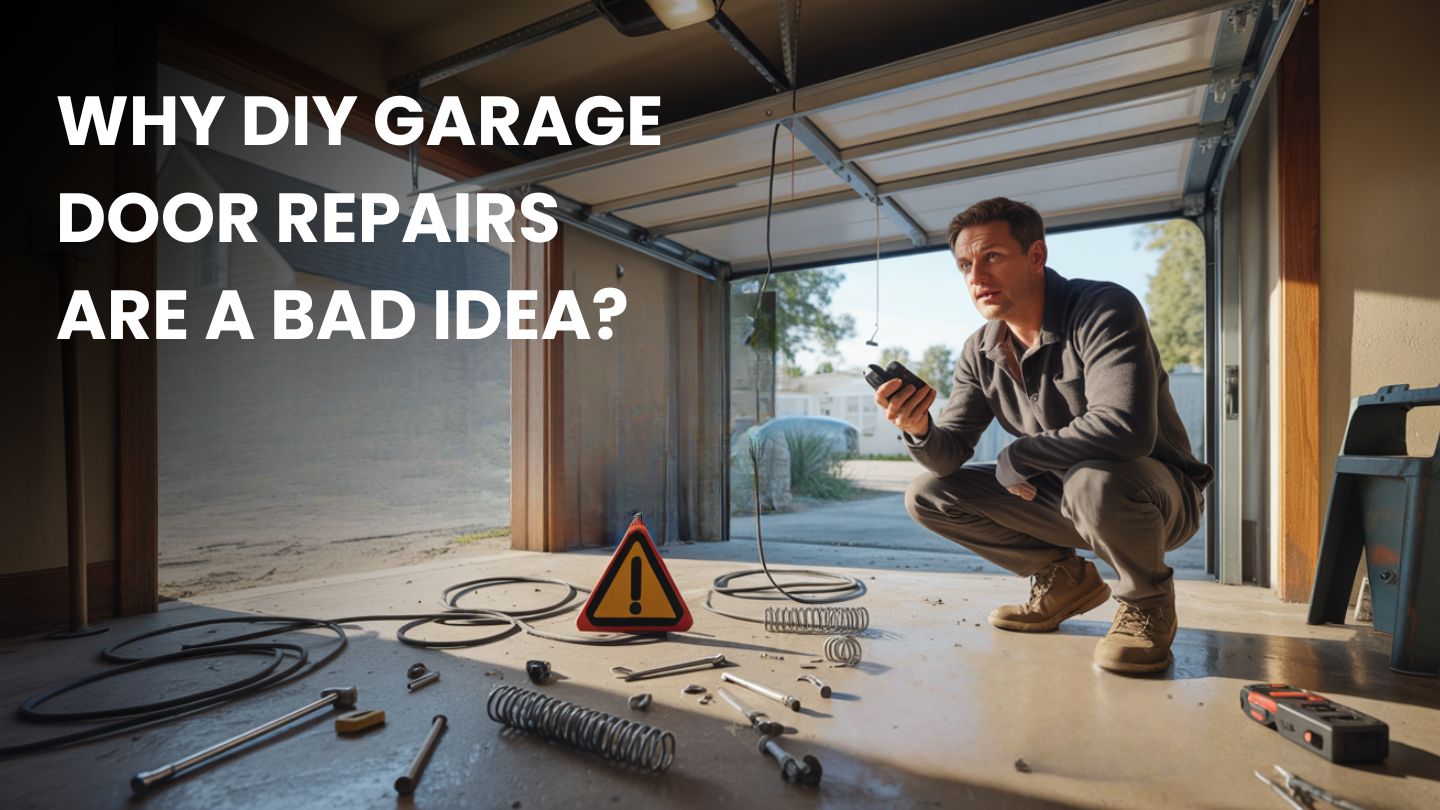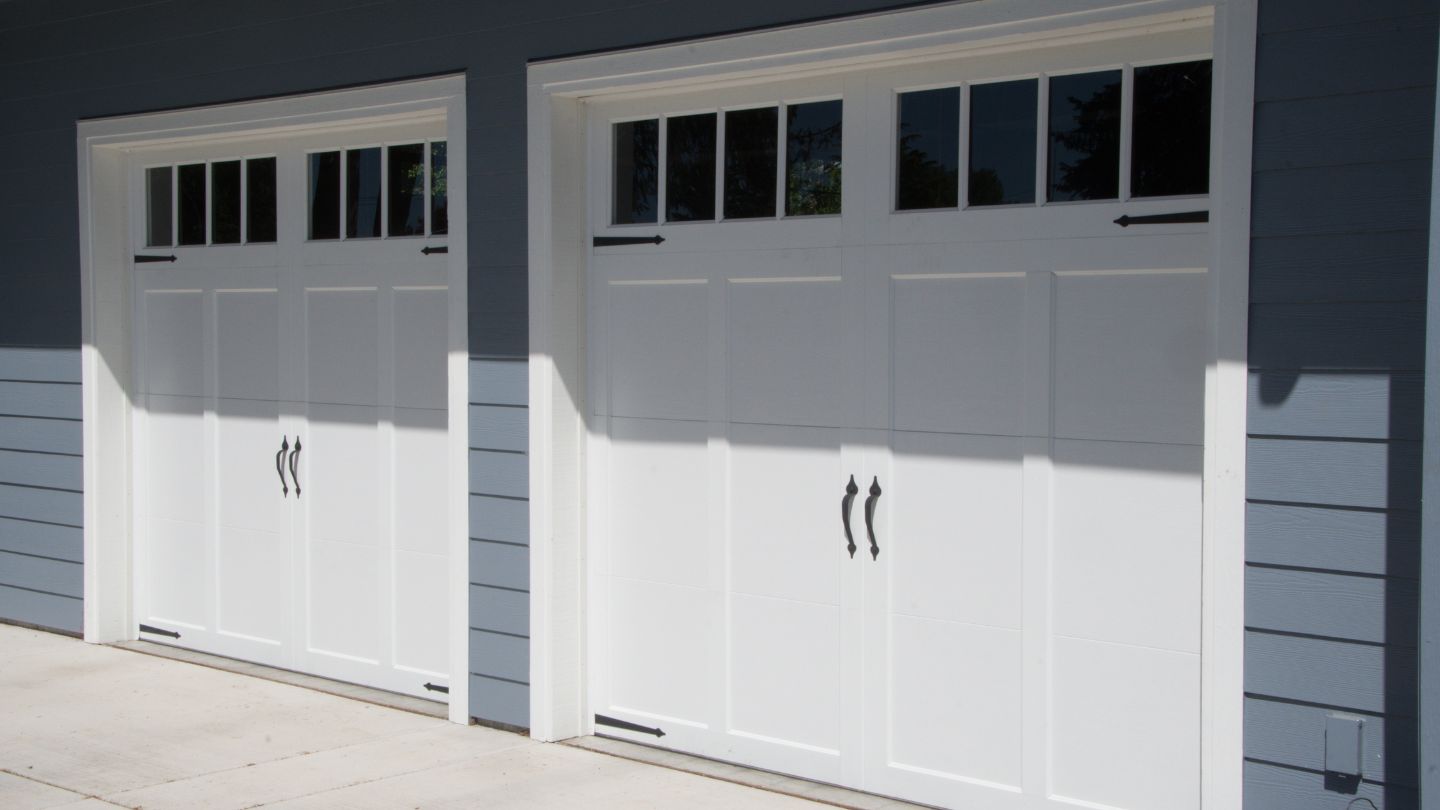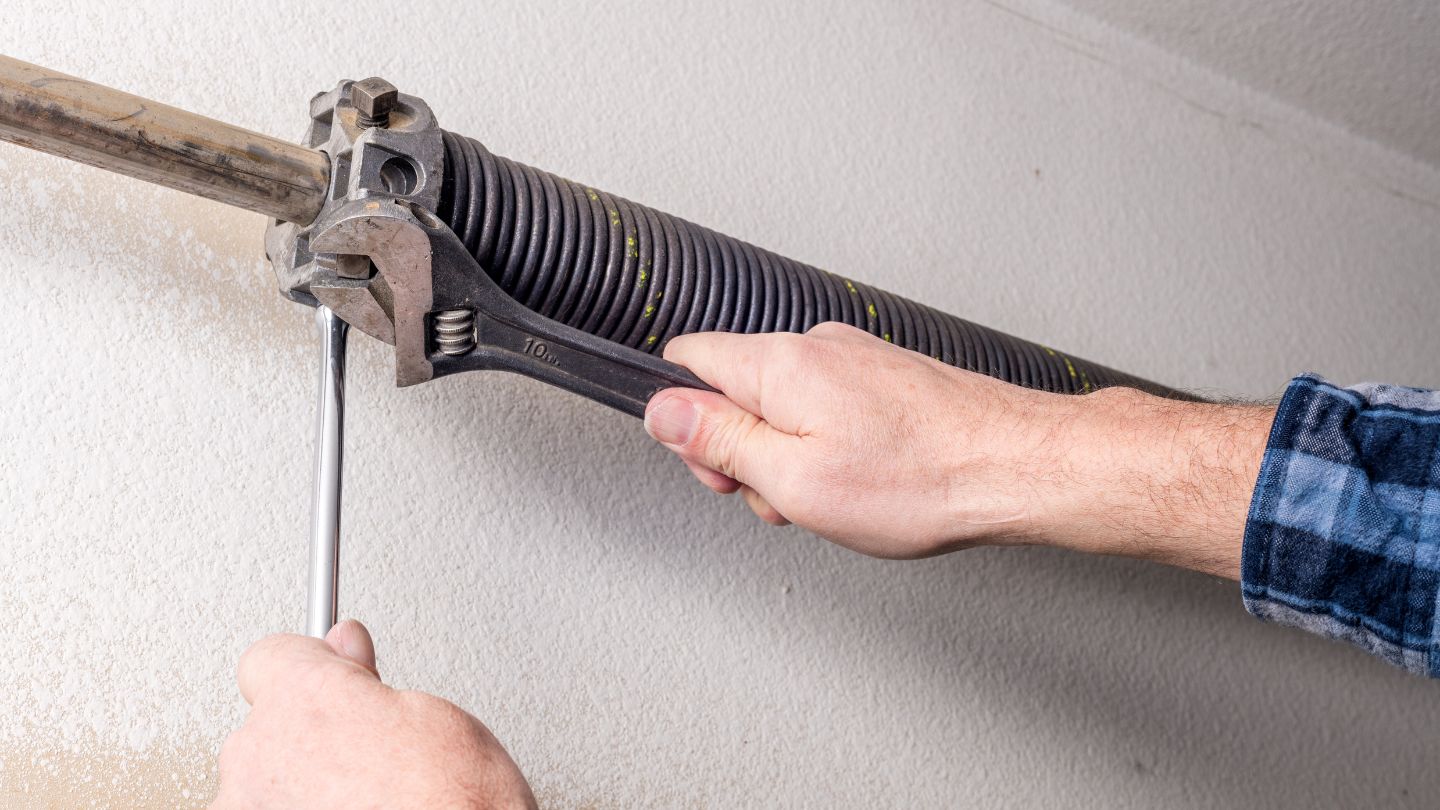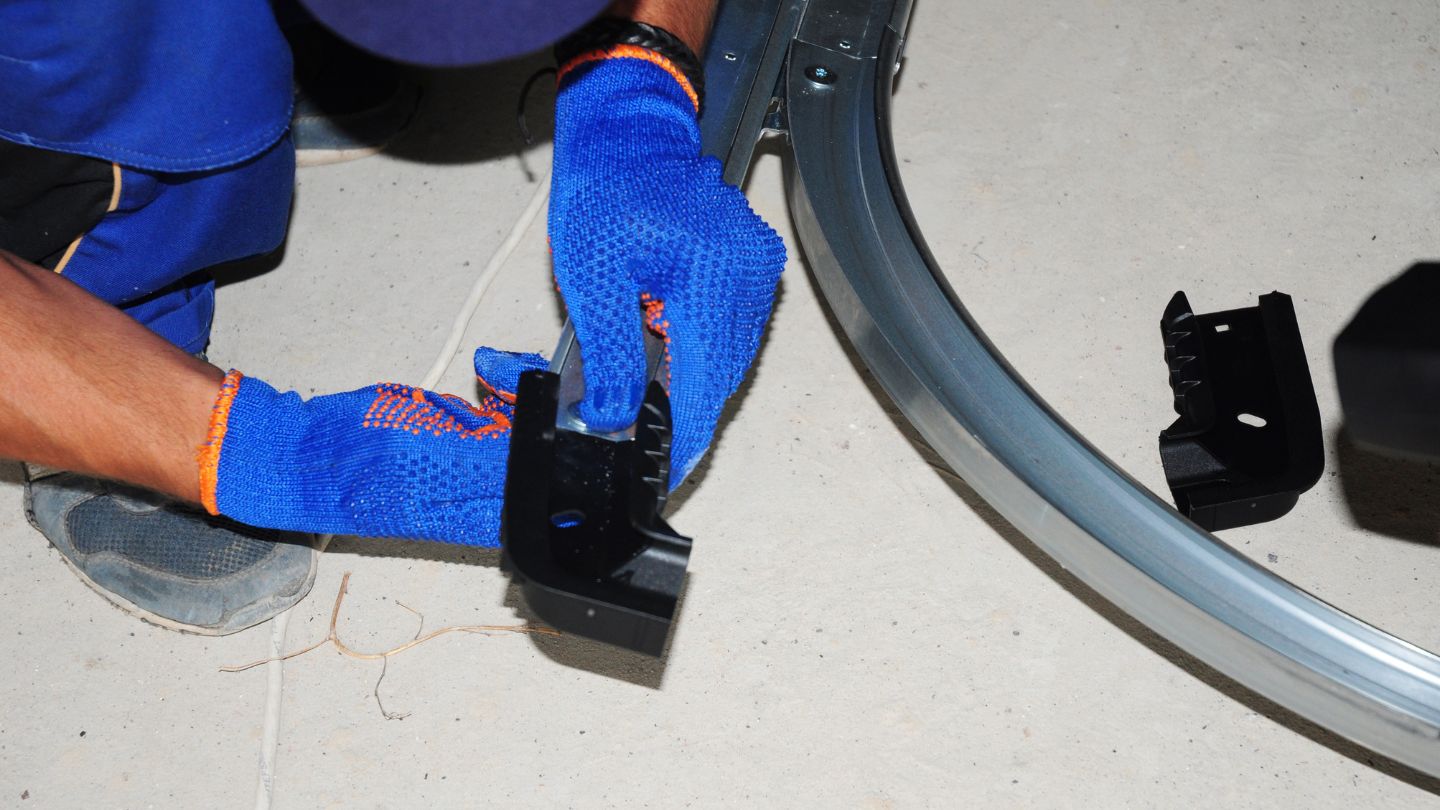
Attempting to repair a garage door on your own may seem like a quick and inexpensive solution, but it often leads to serious safety hazards and unexpected expenses. Garage doors are complex systems that rely on precise balance, high-tension components, and sensitive electrical sensors, all of which require expert handling. Without the proper tools, training, or safety precautions, a simple repair attempt can escalate into a dangerous and costly problem. In this blog, we’ll explain why DIY garage door repairs are a bad idea, the risks they pose, and why professional service is the only safe and cost-effective choice.
DIY garage door repairs may seem like a cost-effective solution, but they come with significant safety risks. One of the most dangerous components of a garage door system is the high-tension cables and springs. These parts are under immense pressure and can cause severe injuries or even death if they snap unexpectedly. Imagine trying to fix a garage door spring, only to have it break and cause broken bones or deep lacerations. This is not just a possibility but a common occurrence in DIY garage door repairs.
Understanding how to avoid garage door repair scams helps homeowners identify red flags and choose trustworthy service providers. Learning to verify credentials, read reviews, and confirm warranties ensures transparency and prevents costly mistakes during repairs or replacements.
Safety protocols are crucial when working on garage doors. Improper handling can lead to serious accidents. For example, incorrectly adjusted springs might cause the door to malfunction and result in injuries. Without proper training, the risks are incredibly high.
Another critical component of garage doors is the safety sensors, also known as photoelectric sensors. These sensors are designed to detect obstacles in the door’s path and prevent accidents. Tampering with these sensors during a DIY repair can disable them, leading to dangerous situations where the door could close on a person or object. Correct installation and functioning of these sensors prevent accidents.
The hidden dangers of DIY garage door repairs underscore the need to prioritize safety over cost-saving measures. The potential for severe injury or death makes professional intervention essential.
Read More: Important Garage Door Safety Tips You Need to Know
Proper tools and knowledge are non-negotiable for garage door repairs. Professional technicians use advanced tools specifically designed for these tasks, which are unavailable to most DIY enthusiasts. These specialized tools improve repair efficiency and effectiveness, leading to superior outcomes.
Handling garage door components, especially torsion springs, requires more than just tools; it demands proper training and experience. The tension in these springs makes them hazardous and difficult to manage without expertise. Professionals can diagnose and fix problems quickly, ensuring safety and correctness.
Knowing the most common garage door repairs prepares homeowners for issues like broken springs, faulty openers, or misaligned tracks. Recognizing these early warning signs and scheduling timely professional maintenance can extend your garage door’s lifespan and prevent unexpected breakdowns.
Given the risks and complexities, hiring licensed professionals for garage door repairs is advisable. Their expertise ensures careful handling of all components, preventing further damage and ensuring longevity. While DIY might seem cost-effective initially, it can lead to costly mistakes and additional expenses later.
One often overlooked consequence of DIY repairs is the potential to void your warranty. Most garage doors come with warranties that provide coverage against defects and failures. However, tampering with garage door components typically nullifies these warranties. DIY repairs can void warranties, leading to loss of protection for future issues.
Without a valid warranty, homeowners may face significant out-of-pocket expenses for repairs that would otherwise have been covered. Certain modifications or repairs done without professional oversight can disqualify warranty claims, leaving you financially held liable for any subsequent problems.
Consider the long-term financial implications before attempting a DIY repair, and make a complex attempt at understanding the costs involved in using a DIY approach to hire the right tools and manage your money.

Improper repairs can cause additional damage and increased costs. For example, a DIY fix causing the door to malfunction might lead to more serious problems. Continuous tinkering without proper knowledge can worsen existing issues, resulting in higher repair costs. A mistake in the repair process can exacerbate these issues.
Inadequate repairs can also lead to increased noise from the garage door, which often signals potential underlying issues. Bent or rusted tracks can cause strain on rollers and springs. This strain can ultimately lead to failure. These structural issues, if unnoticed, can escalate into significant problems that require extensive and expensive repairs.
Moreover, making mistakes during DIY repairs can result in property damage and pose safety risks. If a garage door is not properly aligned or if the springs are not correctly tensioned, it could potentially fall or cause injuries. Engaging professionals can significantly decrease long-term repair costs by addressing issues early and thoroughly.
The potential for additional damage underscores the importance of professional repairs. Additionally, proper handling and timely interventions prevent accidents and ensure the longevity of your garage door system.
Safety sensors are a critical component of modern garage door systems, designed to prevent accidents by detecting obstacles in the door’s path. Federal and state laws mandate that all newly installed garage door systems must include these safety sensors. Non-compliance with these regulations can lead to serious legal repercussions, including fines and legal liabilities.
Tampering with garage door safety sensors is not only dangerous but also against federal laws. The Consumer Product Safety Commission (CPSC) ensures that garage door openers meet specific safety standards, including the installation of functional safety sensors. Bypassing or improperly installing these sensors can lead to liability for any injuries that occur as a result.
To ensure safety and compliance with regulations regarding safety sensors:

Garage door springs are among the most dangerous components to handle during DIY repairs. Under significant tension, attempting to repair them can lead to fatal injuries if they snap. Broken springs can cause the door to crash down, posing a severe risk to anyone nearby.
Professionals are trained to handle the complexities of garage door springs safely. They have the right tools and experience to replace these springs without risking injury. A professional technician checks the entire garage door mechanism, preventing future malfunctions and enhancing safety.
If a garage door spring breaks, call a professional instead of attempting a DIY fix. Errors can lead to severe injuries or death. Professional expertise in handling garage door springs is crucial.
The emergency release cord is a crucial feature for manually operating the garage door during power outages or malfunctions. However, using this cord can be dangerous if the garage door spring is broken. In such cases, pulling the emergency release cord can cause the door to crash down unexpectedly, leading to potential injuries.
Before using the emergency release cord, keep the following precautions in mind:
The emergency release cord disconnects the door from the automatic opener, making the safety sensors ineffective. This can result in dangerous situations, especially if the door is not properly balanced or if there are other underlying issues. Understanding the risks of the emergency release cord underscores the importance of professional maintenance and repairs.
Read more: Signs It's Time to Replace Your Garage Door Springs
Unnoticed structural issues can escalate into significant problems if not addressed by a professional. Regular inspections prevent minor issues from turning into costly repairs or breakdowns. Ensuring the garage door is well-aligned during inspections prevents uneven wear and potential malfunctions.
Trained professionals diagnose garage door malfunctions quickly, saving time compared to DIY attempts that may require extensive troubleshooting to complete the job. Regular inspections extend the lifespan of essential components like springs and cables by ensuring proper maintenance of equipment. If you’re planning a garage door installation, understanding the process and expected time frame can help you prepare effectively.
This proactive approach reduces accident risks and ensures all safety features work effectively.

Poorly executed repairs can significantly shorten the lifespan of garage door components. Repeated DIY attempts can worsen existing problems, resulting in costlier professional repairs. Hiring experts ensures repairs use high-quality parts, enhancing durability.
Professional technicians replace springs safely and check the entire garage door mechanism to ensure proper functioning.
Professional repairs can improve energy efficiency by upgrading insulation and lowering utility bills. Many homeowners find that investing in professional repairs pays off in the long run through reduced maintenance costs and improved performance. The expertise and proper tools of licensed professionals ensure all repairs are done safely and efficiently, including repairing insulation.
DIY garage door repairs may appear cost-effective, but they often result in more harm than good. From high-tension springs and malfunctioning safety sensors to voided warranties and potential property damage, the risks far outweigh the savings. Professional repair and routine inspections not only ensure safe operation but also extend the lifespan of your garage door system, protecting both your home and your investment.
For dependable service and expert garage door maintenance in Dublin, trust Columbus Door Sales . Their certified technicians deliver precise, professional solutions designed to enhance performance, safety, and longevity. With decades of experience, we provide reliable repairs and installations tailored to your home’s unique needs, ensuring your garage door operates safely and efficiently year-round.
DIY garage door repairs pose significant risks, including serious injuries, potential voiding of warranties, and causing further damage. It is advisable to consult a professional to avoid these hazards.
Specialized tools and knowledge are essential for garage door repairs as they guarantee safe and effective fixes, preventing further damage and improving the system's longevity.
DIY repairs can void your garage door warranty by tampering with components, which often leads to nullification of coverage and potential costs for future issues. It's crucial to consider professional assistance to maintain warranty protection.
The dangers associated with garage door springs include the risk of severe injuries or fatalities if the springs snap, particularly during DIY repairs due to the high tension they are under. Always prioritize safety by hiring a professional for maintenance or repairs.